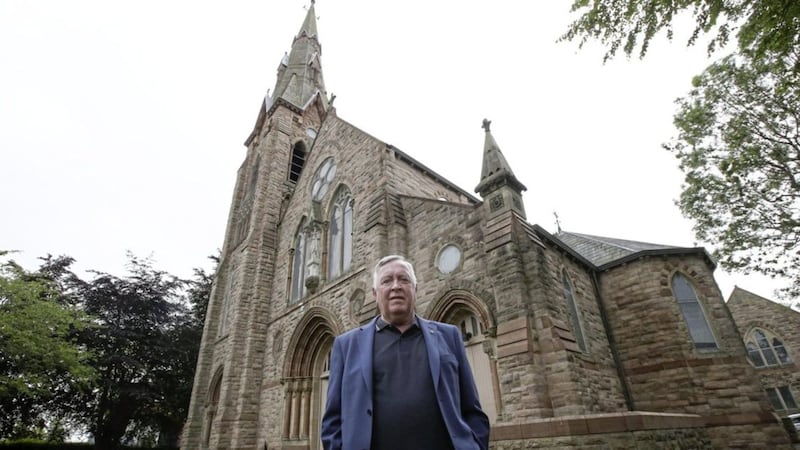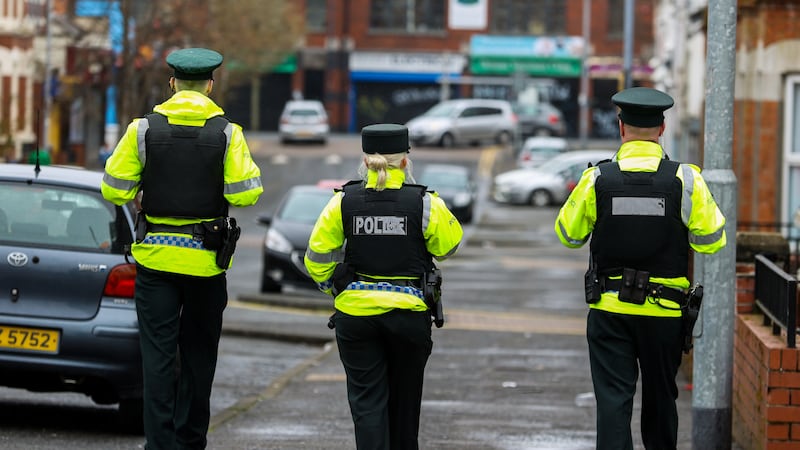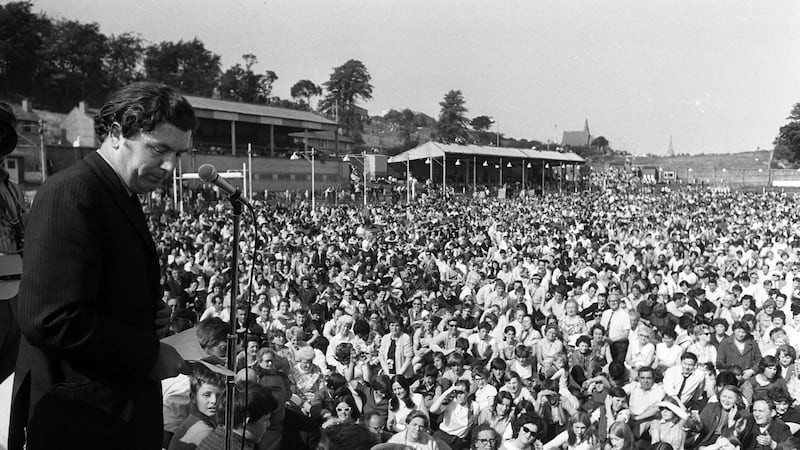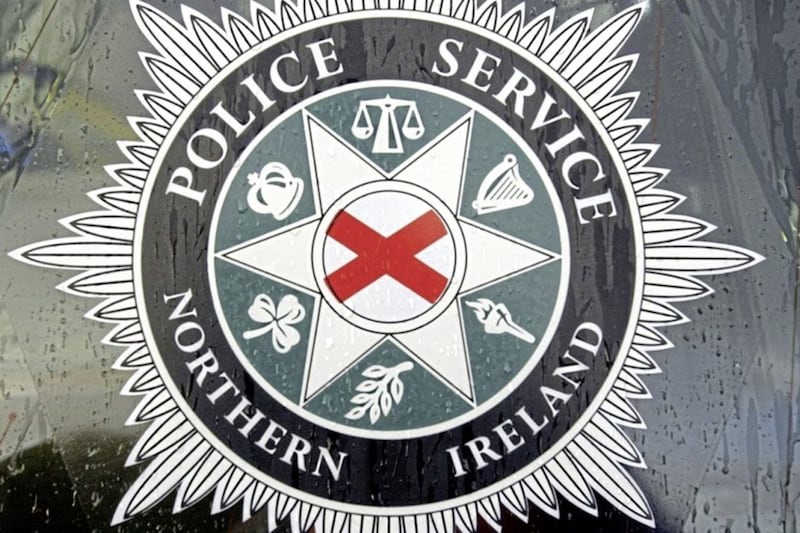NATIONALISTS and republicans across Ireland are set to remember the 50th anniversary of the Battle of St Matthew's today.
Viewed by many as a seminal moment in the emergence of the Provisional IRA, the night-long gun battle between republicans and loyalists in east Belfast resulted in three dead and several others injured.
Nationalists say the fierce firefight broke out after loyalists attacked the landmark church, which fronts the mainly unionist Newtownards Road.
Loyalists claim the trouble in the area erupted after they were attacked by a nationalist crowd and later fired on by republican gunmen.
The violence flared after a mini-Twelfth parade in Belfast earlier in the day.
Tensions are said to have risen as bandsmen and supporters made their way past the church while returning to the east of the city.
On the same night three Protestant men were shot dead during trouble in north Belfast.
As night fell loyalists launched a sustained attack on St Matthew's resulting in republicans, who had taken up position around the church, opening fire.
The historic church had been the focus of loyalist attacks in almost every decade since the pogroms of the 1920s.
In the years between 1920 and 1922 hundreds of Catholics were killed across Belfast, many of them in or around Short Strand.
The Battle of St Matthew's took place just one month before the 50th anniversary of the 1920 pogroms - a period which many older people in the area remembered clearly.
By daybreak on June 28 1970 Henry McElhone, who was a member of a local defence committee, and two men from loyalist east Belfast, Robert Neil and Robert James McCurrie were dead.
Then Belfast Provisional IRA leader Billy McKee, who died last year, was also injured during the gun battle.
It is believed Mr McElhone is the only person who was not a member of the IRA to be named on the republican 'roll of honour'.
It is now broadly accepted that he was killed by a shot fired from his own side.
Veteran republican Hugh McComb was just 17 at the time. He said the events of June 27 must be viewed in the context of the preceding decades.
“It was not just as if this came out of the blue and this was a one-off event,” he said.
“The area had been under attack in the 20s, 30s, 40s, and 50s, it was like a continuum.”
The 67-year-old, who served five and a half years in prison for setting fire to a bus in the 1970s, said that for him the events of August 1969, when loyalists mobs burned hundreds of Catholics from their homes across Belfast, was a turning point.
While living in England he saw news footage of the turmoil engulfing his native city and decided to return home.
“I came into the district and saw barricades up and people manning the barricades with sticks, cudgels and got a sense there was a fear there, a tangible fear there - this area could be attacked at any given time,” he said.
He later visited relations in the Falls Road area.
Their description of nationalists in the area being attacked with little or no defence left a significant impact on the teenager.
“I was talking to a friend of mine two or three weeks after and he had been on the barricades and me and him had the conversation who would you go and see if you wanted to help,” he said.
“We made enquiries and were put in touch with someone and became involved in the republican movement.”
He said that on June 27 tension levels were already high given the events of the previous August.
At the time the Newtownards Road was a thriving retail area used by many people from neighbouring Short Strand.
“Reports started to come in that individuals had been told to get off the road,” he said.
“'We don't want Fenians on this road and when our boys come back we are going to burn you out'.”
He said that as the threatening messages were carried back to the district plans were then put in place for its defence.
“The republican movement in conjunction with the defence group decided to put preparations in place in the event anything was to happen, such as an attack on the area similar to what happened in '69,” he said.
“The preparations were put in place for defensive as opposed offensive action.”
He said that as reports came in about trouble breaking out in west and north Belfast following a mini Twelfth the stress levels began to rise.
Mr McComb explained that as a loyalist band made its way along the Newtownards Road abuse was shouted from both sides of the divide.
“Later we heard that some Catholic bars on the Newtownards Road were being looted – it wasn't a good mix.
“There was a palpable fear in the local community - you could have cut the tension with a knife.”
He said 'defenders' were spread throughout the district and he was located in the Mountpottinger Road area.
However, republicans and loyalists disagree over what sparked the violence and who fired the first shots which lasted for several hours.
“People were shooting at Short Strand and people were shooting back at them, although it was difficult to identify where the shooting was coming from," he recalled.
He said that many of those involved didn't understand “the consequences of their actions taken at that particular time” and described it as a “seminal moment in the politics of the country".
“It permeated across the 32 counties,” he said.
The republican said it was difficult to explain the range of emotions going through his mind at the time.
“I can only talk for myself, on the night there was a fear there but with the exuberance of youth you don't equate it to yourself,” he said.
“It's hard to find the words to express the emotions of that night.”
“There was a sense that the republican movement had reclaimed its prior position - that they would defend nationalist areas.”
Mr McComb said there was no sense of “triumphalism” within republican ranks after the battle.
“It was something that needed to be done and was done to the best of the ability of individual members of the republican movement,” he said.
“There was no sense of triumphalism."
He said the events of June 1970 were purely defensive claiming it would be "crazy" to think a nationalist area with around 3,500 people would launch at attack on unionist east Belfast "which houses 80,000 to 100,000 Protestants".
The long standing republican said there was a unionist narrative that there was an IRA "insurrection" in 1970 .
He added that it was his belief that there was a "conspiracy" between "unionists, the ruling class" and the UVF at this time.
Mr McComb said he believed events that night "gave people in the nationalist community confidence to fight for peace, justice and equality - I know it's cliched but that's what happened.”
Other sources say that on the night of June 27 the IRA had deployed men at key points across the district.
While it was previously thought participants were ill equipped it has now emerged they had access to an array of automatic weapons.
Sources have told The Irish News that some of the weapons available included M1 carbines, 303 rifles, US made Grease guns and a variety of pistols.
In addition, British army logs recently discovered by the research group Paper Trail reveal that there was a major arms find at a local house on the morning of June 28, which included two Thompson machine guns, a British army issue SLR rifle, a Browning machine pistol and five shotguns.
It is also reported that a .32 revolver and 71 rounds were seized.
It is understood that on the night small IRA units were tactically deployed to defensive positions right around the district where they were involved in fire-fights with armed loyalists.
Historian Dr Brian Hanley said events of 1970 had wider significance for the Provisionals.
“Historically for nationalists in Belfast areas like Short Strand were different because they were isolated and could be attacked with impunity and the fact it took place where it did is important and is part of the founding memory of the Provisional IRA,” he said.
Short Strand man Artur Fegan, who has written a local history, said: “What happened on June 27 was anticipated by the older generation who were there. The British knew the consequences of it as well, all the rest is window dressing.”








